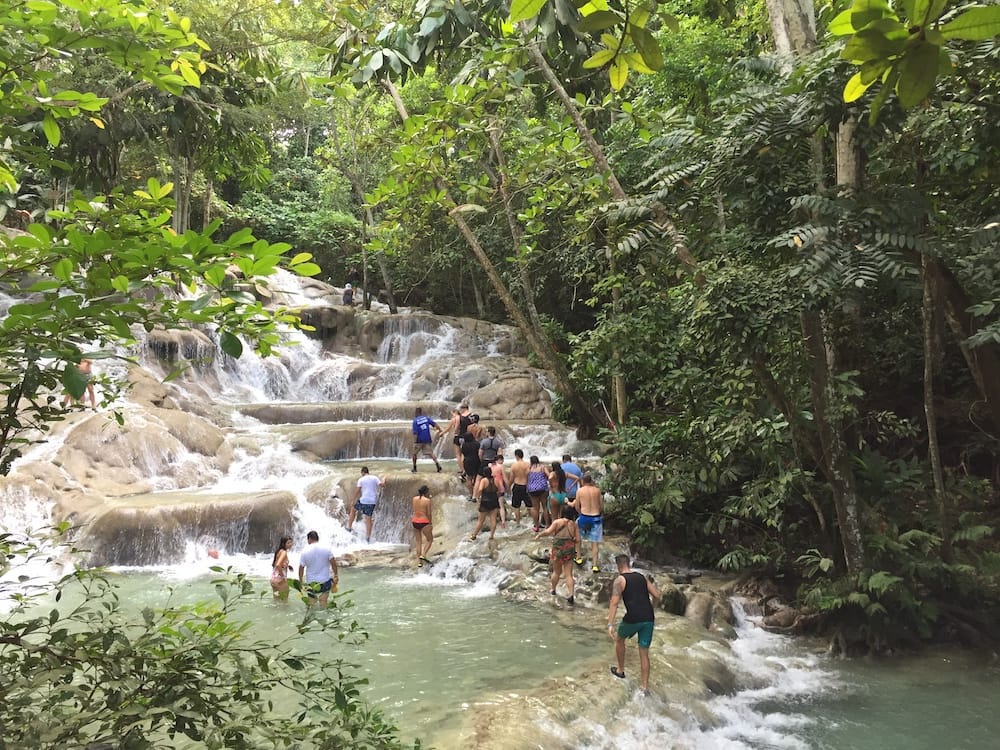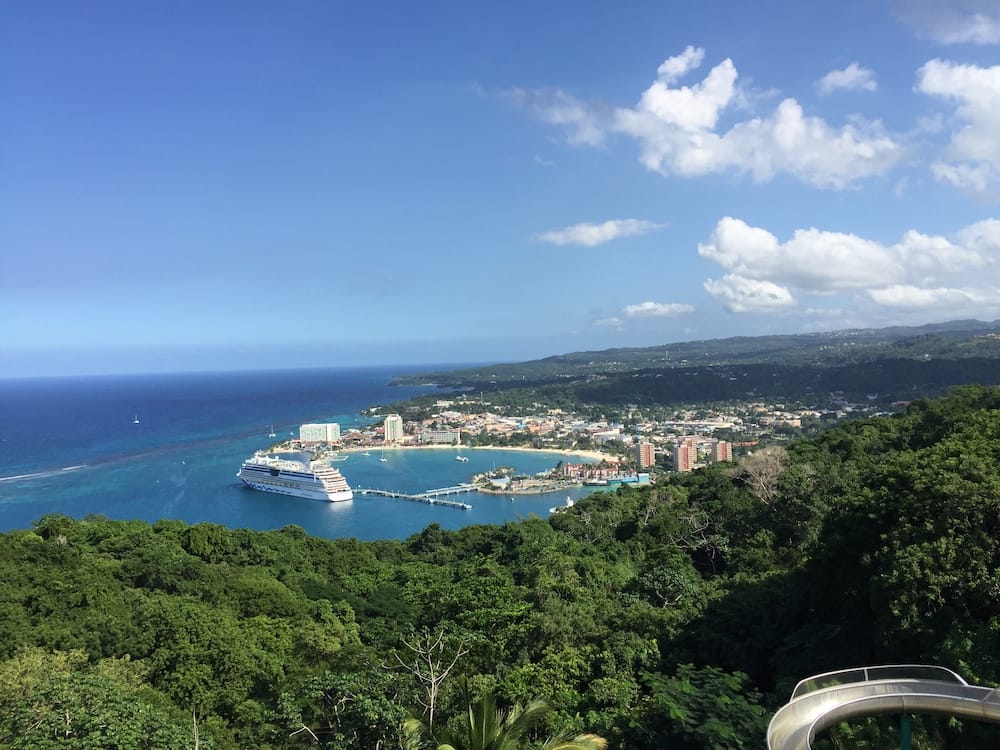We were supposed to dock in Jamaica early in the morning but during the evening entertainment in the theatre the first night, the jolly American MC was interrupted by the Captain on the ship’s speaker system telling us that we were turning back for Miami with a sick passenger who had to get to hospital as fast as possible. That was eight extra hours there and back. I suppose this happens all the time, especially with the average age of the passengers being well North of 60, but the excursion crew must have worked all night to rearrange the day trips organized and coordinated with local companies.
That interruption was not welcome, but generally I loved hearing the Captain telling us where we were going every morning, and how we were going to get there. This was because the Captain was Italian, from Genoa, where the ship was commissioned, and he spoke incredibly slowly in English with an accent that was so Italian it sounded like a parody. Every phrase ended in an aspirated ‘a’:
“Good-a morning-a, Passengers-a. This is-a your-a Captain speaking-a.
We will-a set-a sail at oh-a seventeen-a hundred hours-a for Jamaica-h, first-a sailing-a to-a port-a at a speed-a of 5-a knots-a.”
I could have listened to him all day. His voice, along with the thrumming of the ship’s engines sent me into a trance-like state. The measured cadence of his speech was reassuring. This Italian captain wasn’t going to run us into rocks and abandon ship like the captain of the Costa Concordia. Never. This was a Master Seaman. His appearance reinforced confidence too. On Formal Night he was stately and heart-swellingly resplendent in his starched white uniform. When he welcomed passengers on board from a balcony overlooking a glittering central lobby he looked like Pavarotti about to burst into ‘Nessun Dorma’.
Observation # 3
Cruise ships are so large that they employ a tailor whose sole job is to mend and alter crew uniforms and ship linens. One of our tour guides had worked on ships in this role.

Generally, cruise ships sail in the evening and dock early in the morning. Then passengers stream off the boat to go on day excursions. Because of the medical transfer, it was mid- morning before we docked, and we had plenty of time to watch our approach to the hilly, lush Golden Coast of this island and the neat and tidy Georgian port town of Falmouth. We had booked a trip to climb the natural limestone steps of Dunn’s River Falls and go up in a chairlift through the rainforest.
Things were rushed because of the lost time, but the beautiful young guide was cheerful and competent, and we spent the bus ride to Dunn’s River Falls learning Jamaican patois, singing ‘Day-O’ and getting a potted version of the country’s history and culture. Shortly after teaching us to say how many ‘pickneys’ (children) we had, the guide pointed out a statue of Christopher Columbus. “What do Jamaicans think of him?” a passenger asked. The guide brought out her rote reply without dropping her smile: “We respect that he revealed Jamaica to the world, but we do not like him.” Pointing up into the emerald-green hills, she told us that Bob Marley was born and brought up there, and described current day ‘Fashionista Rastas’; young people who wear the dreadlocks and hats and enjoy reggae music and cannabis, without following the Rastafarian faith or dietary rules.

The Dunn’s River Falls were shadowed by the rainforest and were cool and refreshing. The long chairlift ride to the top of the mountain gave us plenty of time to look at the vast tree canopy up close, and the glorious sweep of Montego Bay, an Egyptian blue sea crusted by pale sand. At various cross-stations we caught glimpses of braver souls than us buzzing past on zip lines, the flyers’ screams sometimes following them like the subsonic boom of a fighter jet. They advertise zip-lining as a way to get into nature and see the rainforest up close, but these white-knuckled participants appeared to be concentrating only on how they were going to land without breaking an ankle after their 30-second journey.
Observation # 4
Many cruisers are adventurous physically but stay-at-homes at the slightest whiff of the less-than beautiful side of the country they are visiting. We met a 70-year-old man from the United States who zip-lines/bungee-drops/river rafts at every place he stops on a cruise, and yet when passengers found out there was going to be a peaceful street demonstration in Cartagena, Colombia on our stop there – which all the tours would avoid – many announced they would not leave the ship. As the cruise progressed, I counted at least ten people roaming the ship with legs in casts, broken arms etc. I’m certain not one passenger had to be sprung from a Colombian jail after being caught up in a union rally.
At the top of the mountain we learned more about Jamaican history and culture, watched the huge and colourful butterflies feeding on bright flowers, and ate jerk chicken – what else? On the bus back to the ship the guide was silent and most of the travellers tired, which unfortunately gave the Mormon grandmother from Utah sitting next to me the opportunity to tell me in excruciating detail about her 20 or so grandchildren and great grandchildren. (She won the prize for having the most pickneys).
Observation # 5
Many people from the United States have perfected how to tell you their life story with astonishing efficiency. This is because on the whole a) they practise a lot b) they don’t waste time asking you about yourself. (To my US friends; this is not a criticism. It’s a world more efficient than the 300 interactions you have to have with a Brit to get to the same point.)
In a cruise ship breakfast buffet, you quite often find yourself sitting next to a stranger, and getting to know your fellow cruisers is fun and is as simple as asking “Where are you from?” MLH and I kept a tally, and only one person from the US we talked to ever asked us more than that question in return. Some of the stories and people were fascinating and astonishing, and we would have liked to get to know them better, but the truth is the likelihood of running into the same person again on a ship that size is low. Here are some of our favourite Brief Encounters, all information given in less than ten minutes:
An 80 year-old New York widow who retired from nursing at 75 after emergency heart surgery, ardent pickle ball player and line-dancer. One son a paramedic, one a fire chief who survived 9/11 because he was playing a charity golf tournament on Staten Island; he joined his colleagues in his golf shirt. All his crew except the truck driver died.
A Hungarian-American, I’m guessing Jewish, who escaped to the US just before the borders closed in 1956 and learned to speak English serving in the US Navy in the Far East. I was dying to ask him about how he got out of Hungary – with false papers? Smuggled in the bottom of a coal barge on the River Danube? But he only wanted to tell us about the exoticism of the Far East in the 1950s.
A couple in their eighties, her as giddy as a 20-year-old, flashing an enormous engagement ring and telling us how she got him (a widower) to propose after arduously driving him to choir practice for a year. I thought he was a bit dim to ignore the hints for so long, as she had run an in-home nursing service for seniors and would be a perfect late-life companion. He was the owner of an engineering company, still going in to work every day because he was still useful. After the Coles Notes of their relationship, they left us to dance. He danced with his fiancée on one hand, his cane in the other.
We left Jamaica feeling rushed and a bit dissatisfied and readied ourselves for two nights and a day at sea. This is when you really get to know the ship, and the ship is prepared. The daily event schedule is always busy, but on the days when no one can leave the ship, the entertainers go into high gear. There is no excuse to be bored on a cruise ship. Something somewhere is going to keep you busy/entertained/full/relaxed/inebriated/informed/healthy/unhealthy/spending money.
During the day you can gamble at the casino, swim in the pool, watch movies on the big outdoor screen, play mini-golf, pickle ball and ping pong, walk the observation deck and learn all sorts of things. There are prayer groups, knitting groups, singles meetups, the Antique Car Enthusiasts’ Club, The Gay and Lesbian Group, and Alcoholics Anonymous. I went line dancing, which provided physical and mental exercise and didn’t require a partner (my foray into dance lessons several years ago with MLH is another, rather sad, story). Plus, I like the names of the dances. So, there I was, gleefully doing The Chicken Dance, Cotton Eyed Joe and The Electric Slide with the lady from New York, three or four other white people, and about 30 middle-aged Asian women. Asian women also loved the sauna and steam room in the spa. They chatted so much I picked up a few words of Mandarin just by the repetition. MLH had a more interesting time in the men’s sauna, because that’s where the Digital Nomads hang out.
Observation #6
With working habits changing, the make up of cruise passengers is changing too. Now that big cruise ships have very good satellite systems, you can buy wi-fi access for about US$15/day, and this allows people who work online to live on cruise ships if they want to. MLH met a programmer from Florida, who sold his house and goes from one Caribbean cruise to another, getting huge discounts because of the rewards system. He said it was cheaper and more comfortable than living on land.
MLH and I headed for the gym, which was always busy, and eavesdropped on seminars with subjects such as ‘How to Detoxify’ and ‘Proper Posture to Eliminate Back Pain’.
Observation #7
The people who go to health seminars on cruise ships are not the people who need to go. The people who need to go are eating four-five times their daily calorie requirements in the restaurants and cafes.